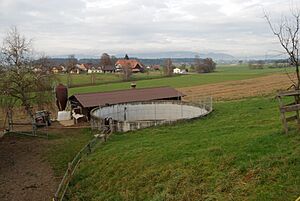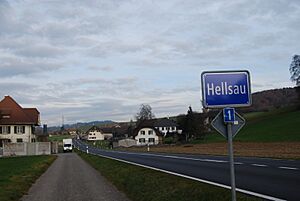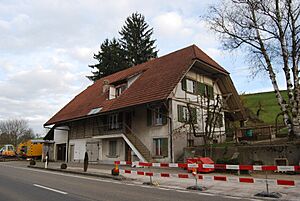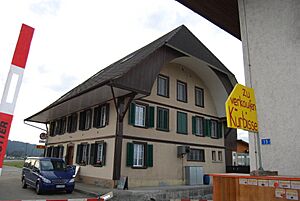Hellsau facts for kids
Quick facts for kids
Hellsau
|
||
|---|---|---|
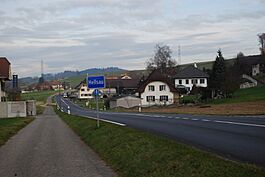
Entrance into Hellsau village
|
||
|
||
| Country | Switzerland | |
| Canton | Bern | |
| District | Emmental | |
| Area | ||
| • Total | 1.48 km2 (0.57 sq mi) | |
| Elevation | 478 m (1,568 ft) | |
| Population
(Dec 2020 )
|
||
| • Total | 214 | |
| • Density | 144.6/km2 (374.5/sq mi) | |
| Postal code |
3429
|
|
| Surrounded by | Alchenstorf, Heinrichswil-Winistorf (SO), Höchstetten, Seeberg | |
Hellsau is a small town, also called a municipality, located in the Emmental area of the canton of Bern, Switzerland. It's a quiet place with a rich history and beautiful natural surroundings.
Contents
History of Hellsau
Hellsau was first mentioned in official records way back in 1275. At that time, it was called Hellesowe.
Early Settlements and Churches
People have lived in Hellsau for a very long time. The oldest sign of a settlement is an early medieval cemetery. It's believed that an old village church once stood near this cemetery. This church was first mentioned in 1275. It became a full church in 1353, dedicated to St. Mary. Later, it became part of the parish of Koppigen in 1422. After the Protestant Reformation, the church was no longer used and was eventually taken down.
Life in the Village
For most of its history, Hellsau was connected to the nearby town of Koppigen. Koppigen's town council made decisions for Hellsau. For example, in 1571, Koppigen made a rule about fences. This was because farmers from Hellsau were letting their animals graze in Koppigen's fields!
Even today, farming is important to Hellsau's economy. However, a construction company also provides many jobs for people living there. From 1894 to 1911, Hellsau was home to a private hospital. In the 1940s, some marshy areas and meadows were drained to make more usable land.
Education in Hellsau
Hellsau and the nearby town of Höchstetten have shared a school district since the 1820s. This means students from both towns might go to the same schools. The Moos school house was built in 1976.
Changes in Administration
On December 31, 2009, Hellsau's old district, Amtsbezirk Burgdorf, was closed. The very next day, January 1, 2010, Hellsau became part of a new district called Verwaltungskreis Emmental.
Geography of Hellsau
Hellsau covers an area of about 1.5 square kilometers (0.58 square miles). Most of this land is used for farming. About 71.6% of the area is farmland. Forests cover about 23.6% of Hellsau. The remaining 6.8% of the land is where buildings and roads are located.
Land Use Details
Within the built-up areas, industrial buildings make up a small part (1.4%). Homes and other buildings are 2.7% of the total area. Roads and other transport areas also make up 2.7%. All of the forested land in Hellsau is covered with thick forests. For farming, 48% of the land is used for growing crops. Another 21.6% is used for pastures where animals graze. A small part (2%) is used for orchards or vineyards.
Parts of Hellsau
The village of Hellsau includes the main village area, a place called Halde, and two smaller settlements known as hamlets: Freienhof and Moos. Hellsau is also part of the church parish of Koppigen.
Hellsau's Coat of Arms
The blazon (description) of Hellsau's municipal coat of arms is Vert a Bend wavy Or and in a Chief Argent three Pales Gules. This means it has a green background with a wavy gold stripe. At the top, there's a silver section with three red vertical stripes.
The lower part of the coat of arms is a "canting arms". This means its design hints at the name of the place. It represents a "light meadow" or helle Au in German, which sounds like Hellsau.
Population and People in Hellsau
As of 2010, Hellsau had a population of 188 people. About 2.6% of the people living in Hellsau are foreign nationals. Over the past 10 years (2000-2010), the population has slightly decreased by 5%.
Languages Spoken
Most people in Hellsau speak German. In 2000, 97.9% of the population spoke German as their main language. A few people also spoke French or Dutch.
Population Makeup
In 2008, about 51.3% of the population were male and 48.7% were female. Most residents are Swiss citizens. In 2000, about 28.5% of the people were born in Hellsau itself. Many others were born in the same canton (48.2%) or elsewhere in Switzerland (19.2%). A small number (3.6%) were born outside Switzerland.
Age Groups
As of 2010, young people (0–19 years old) make up 25.4% of Hellsau's population. Adults (20–64 years old) are the largest group at 61.1%. Seniors (over 64 years old) make up 13.5%.
Households and Homes
In 2000, there were 12 households with only one person living in them. There were also 8 households with five or more people. Most apartments (95.7%) were lived in all year round. In 2010, new homes were being built at a rate of about 5.2 new homes for every 1000 residents.
Economy of Hellsau
In 2011, Hellsau had a very low unemployment rate of 0.08%. This means almost everyone who wanted a job had one. In 2008, a total of 128 people worked in the municipality.
Job Sectors
Jobs are often grouped into three main sectors:
- Primary sector: This includes jobs that get raw materials from nature, like farming or forestry. In Hellsau, 23 people worked in this sector, mostly in agriculture.
- Secondary sector: This involves making things, like in factories or construction. In Hellsau, 83 people worked in this sector. Most of these jobs (97.5%) were in construction.
- Tertiary sector: This includes jobs that provide services, like shops, restaurants, or schools. In Hellsau, 22 people worked in this sector.
Commuting to Work
In 2000, 84 workers traveled into Hellsau for their jobs, while 63 residents traveled out of Hellsau to work elsewhere. This means Hellsau has more people coming in for work than leaving. About 10.3% of the working population used public transportation to get to work, while 55.7% used a private car.
Religion in Hellsau
According to the 2000 census, most people in Hellsau belong to the Swiss Reformed Church (80.8%). A smaller number (5.2%) were Roman Catholic. About 9.33% belonged to other Christian churches. There were also a few people (1.04%) who were Islamic. About 8.29% of the population did not belong to any church or were agnostic or atheist.
Education in Hellsau
In Hellsau, about 42% of the population has completed upper secondary education. This is schooling after primary school that is not mandatory. Also, about 12.4% have completed higher education, like attending a university or a Fachhochschule (a type of professional university).
Swiss School System
The Canton of Bern has a specific school system. It starts with one year of non-mandatory Kindergarten. After that, students attend six years of Primary school. Then comes three years of mandatory lower Secondary school. In this stage, students are grouped based on their abilities. After lower Secondary, students can choose to continue their schooling or start an apprenticeship to learn a trade.
Students in Hellsau
During the 2009-10 school year, 31 students attended classes in Hellsau. There were no kindergarten classes in the municipality at that time. Hellsau had 2 primary classes with 31 students. In 2000, 15 students came to Hellsau from other towns for school, while 11 Hellsau residents went to schools outside the municipality.
See also
 In Spanish: Hellsau para niños
In Spanish: Hellsau para niños
 | Victor J. Glover |
 | Yvonne Cagle |
 | Jeanette Epps |
 | Bernard A. Harris Jr. |





